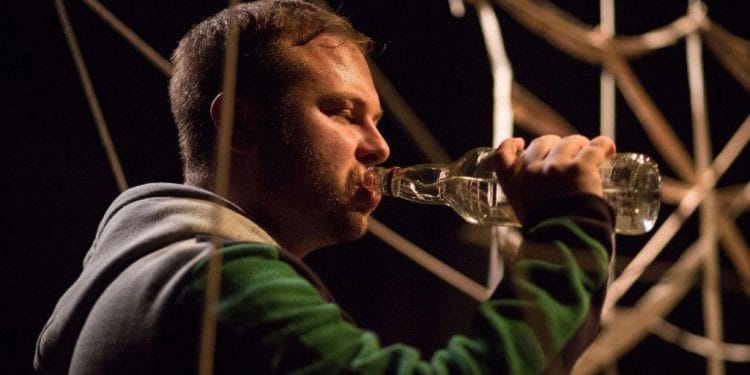 Having already enthralled audiences with an earlier run at The Bread and Roses Theatre, Faded Ink’s Starved now comes to the Hope Theatre, under the direction of Matt Strachan. Written by Michael Black, who also stars in the production, this highly taught examination of a toxic relationship from the viewpoint of a Northern working-class couple, is a gripping piece of theatre which is both raw and unsettling.
Having already enthralled audiences with an earlier run at The Bread and Roses Theatre, Faded Ink’s Starved now comes to the Hope Theatre, under the direction of Matt Strachan. Written by Michael Black, who also stars in the production, this highly taught examination of a toxic relationship from the viewpoint of a Northern working-class couple, is a gripping piece of theatre which is both raw and unsettling.
The two-hander is comprised of a couple, simply referred to as Lad and Lass who find themselves squatting in dilapidated bedsit on the roughest estate in Hull. They are criminals on the run, though as Lad points out, they are hardly Bonnie and Clyde. The details of their crime unfold slowly across the course of the play, but like so much of the script, the revelations spark more questions than answers.
At first glance the two characters appear well suited to each other, but soon we begin to wonder just how much control they are exercising over each other. Their relationship brings a whole new meaning to the concept of love and hate; they taunt and tease each other, with it always escalating to the point where it crosses a line, and the resultant hurt is obvious to see.
Lad is clearly the most manipulative in the relationship, his insecurity manifesting itself in emotional abuse, and a temper which erupts sporadically like a once dormant volcano. Michael Black has this role down to a tee, the intimacy of the space means you can see the coldness behind his eyes as he spews out one hateful insult after another, only for our attitude towards him soften as he begins to show affection to Lass once again.
Alana Connaughton gives an incredibly heartfelt and emotional performance, you can feel her suffocation bearing down upon you, as her imprisonment, both metaphorical and literal, becomes too much to take. The weakness and vulnerability which Connaughton manages to portray really gives us the sense of a character who has moved from one controlling relationship to another.
Both of the characters find themselves in solitude, all but cut off from the outside world, and this is cleverly reflected in Esteniah Williams set design, comprised of interlacing ropes which form a cage around the couple. It is on one hand their grotty bedsit, and on the other, it is the cell which they have created for themselves, and each other.
Aiden Bromely’s lighting also picks up the light and shade of the relationship, the brightness intensifying as the pair think back to happier times, or dream of a better future. In the most troubled aspects of the relationship we find ourselves in near darkness, as any kind of happiness is sucked out of the room.
Yet despite the crushingly desperate circumstances there are moments of comedy, Lad’s inability to effectively act as the ‘breadwinner’ for example, managing to only steal Cup-A-Soup, opens up some humorous dialogue which later proves to be more important than we may have initially thought.
This is a difficult story to tell, because so much of it is wrapped up in the psychological battle each character is having with themselves, as well as the actions they take against each other. Yet, Starved manages to say so much in so little time, by the end it feels like we know Lad and Lass perhaps better than they know themselves. This is a very impressive short play which continues to transfix audiences with its naturalistic dialogue, and all too believable portrayal of a damaged relationship.



















